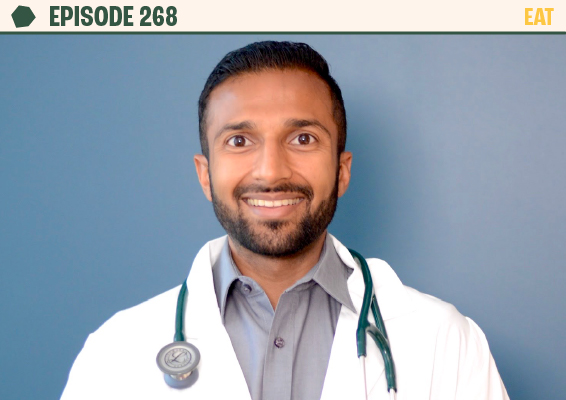Recent years have seen a surge in interest in the gut microbiome, an intricate area of research that is only just beginning to reveal its vast implications for our health. Even though we are just at the outset of fully understanding this complex ecosystem, there have already been exciting discoveries that set science on the path to understanding the role of the gut microbiome more comprehensively. In Episode #267, I’m joined by Dr Suzanne Devkota for a deep dive into the gut microbiome’s influence on inflammatory and metabolic diseases.
“I can’t emphasise enough a diverse diet; diversity begets diversity. It is a fundamental principal of ecology and evolution, and our gut microbes abide by that law.”
Dr Suzanne Devkota stands at the forefront of microbiome research. As the Director of Microbiome Research at Cedars-Sinai Medical Center and an appointee at the University of California-Los Angeles Department of Medicine, she deepens our understanding of the gut microbiome’s role in inflammatory and metabolic diseases. Her research, published in highly esteemed journals like Nature, sheds light on the increasing prevalence of diseases such as IBD, diabetes, and food allergies. Currently, she explores the fascinating sphere of pathobionts and the translocation of gut bacteria. With a strong academic background from the University of Illinois and The University of Chicago, Dr Devkota has become a significant figure in this rapidly emerging field. Her accomplishments include multiple NIH R01 grants and the prestigious NIH Director’s Pioneer Award.
“It never works in the extremes… it’s always about balance in the body.”
In this intriguing episode, Dr Devkota helps us unravel the intricate connections between our gut microbiome and various health conditions. We discuss the rapidly expanding understanding of the microbiome, including its relationship to conditions like food allergies, intolerances, inflammatory bowel disease (IBD), and obesity. She shares valuable insights into the role of our microbiome in these conditions, cautioning us to avoid overhyping its influence while appreciating its synergistic effects with other health factors.
Moreover, Dr Devkota delves into practical guidance on maintaining a healthy microbiome, underscoring the importance of a diverse diet rich in fibres. She addresses current debates about microbiome testing, the use of probiotics, and the impact of diet on our gut health, specifically discussing topics such as FODMAP, the role of different fats, protein requirements, and food additives. This conversation not only brings cutting-edge research on the gut microbiome to the forefront but also offers practical takeaways that can enhance your personal health journey.
Specifically, we discuss:
- Intro (00:00)
- The evolving field of microbiome research (02:13)
- Gut microbe on social media (09:32)
- Microbiome definition (12:48)
- Why the focus on gut bacteria? (13:55)
- Differences in Microbes (16:02)
- Microbial shifts and adaptations (18:45)
- Microbes perturbations (21:35)
- Human microbiome in evolution (23:54)
- Healthy microbiome and diversity (27:47)
- Is the microbiome the sole driver of metabolic diseases? (33:05)
- Dietary patterns and FODMAP intolerance (41:07)
- Saturated fat and gut health (49:15)
- Microbiome metabolites and heart disease risk (57:42)
- Inflammatory bowel disease (IBD) and dysbiosis (1:02:09)
- Food additives (1:12:29)
- Supporting the microbiome in IBD (1:15:29)
- Microbiome’s interaction with fat cells (1:16:52)
- Short-chain fatty acids and appetite regulation (1:29:26)
- Practical tips for nourishing a healthy gut (1:31:05)
- Microbiome’s interaction with Polyphenols (1:38:43)
- On supplements and fermented foods (1:39:15)
- Factors affecting gut health beyond nutrition (1:46:22)
- Outro (1:50:10)
This insightful conversation with Dr Suzanne Devkota underscores the significance of understanding our gut microbiome for overall health. Her wealth of knowledge, informed by her pioneering research, offers us practical guidance to improve our wellbeing. I’m truly thankful to her for sharing her expertise; I hope you found this conversation as interesting and important as I did.
Connect with Dr Suzanne Devkota on Instagram and Twitter. Learn more about her research at https://www.devkotalab.com/thelab.
The best way to support the show is to use the products and services offered by our sponsors. To check them out and enjoy great savings, visit theproof.com/friends.
Enjoy, friends.
Simon
More about Suzanne Devkota, PhD
Suzanne Devkota is the Director of Microbiome Research at Cedars-Sinai Medical Center in Los Angeles, and is jointly appointed at Univ. of California-Los Angeles in the Dept. of Medicine. Her lab studies the role of the gut microbiome in inflammatory and metabolic diseases originating in the GI tract. Her research into dietary impacts on host-microbe interactions has led to some of the first mechanistic insights into why diseases such as IBD, diabetes, and food allergies have rapidly increased over the last 50-100 years and culminated with a publication in Nature cited over 1600 times. Her ongoing research focuses on the role of pathobionts- symbiotic microbes that turn pathogenic under certain selective pressures- on host immune responses, and counteractive nutritional therapies. More recently her lab has developed interest in studying the microbial ecology of gut bacterial translocation in the human body, and the host response, particularly of adipose tissue.
Dr. Devkota received her B.S in Biology and Chemistry from the University of Illinois at Urbana-Champaign, where she also received her M.S. in Nutritional Sciences. She earned her Ph.D. from The University of Chicago in Molecular Metabolism and Nutrition where she began specializing in Gastroenterology and the newly emerging field of the Microbiome. She completed her post-doctoral training at the Joslin Diabetes Center at Harvard Medical School and is a former Branco Weiss Fellow. Her lab is funded by multiple NIH R01 grants and an NIH Director’s Pioneer Award, and has been an invited panellist at the Nobel Prize Dialogues in Tokyo and Berlin on topics of “The Future of Food” and “Equality and Responsibility in Research”.







